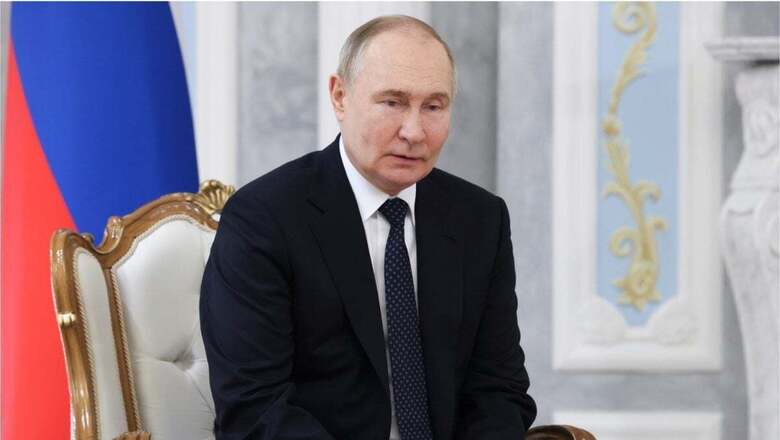
views
The Ukraine conflict is acquiring increasingly dangerous dimensions. The US is today engaged in an open proxy war against Russia by providing arms, training, intelligence, instructors and funds to Ukraine to sustain its conflict with Russia.
The US has declared openly that its goal in the Ukraine conflict is to inflict a strategic defeat on Russia, weaken it militarily to the point that it can no longer pose a threat to its neighbours, in the hope that this could lead eventually to a regime change in Russia.
The US has applied the most draconian sanctions on Russia to cause its economic collapse. It has sought to isolate Russia diplomatically. It has manoeuvred to declare President Vladimir Putin a war criminal.
This US/NATO strategy has not worked. The Russian economy has weathered the sanctions. After initial setbacks, the Russian army has recovered ground. Russia has ramped up its production of war material. It has adapted its military response to new weapon technologies and advanced NATO arms and tactics employed against it. It has limited its war aims and used its military resources commensurately.
Russia is not isolated diplomatically. Its strategic partnership with China has reached unprecedented levels. India is determined to preserve its traditional ties of trust and friendship with Russia and has resisted Western pressures to dilute ties with Moscow. Russia is today the biggest oil supplier to India.
India has refused to condemn Russia for its military action in Ukraine and has abstained on UN Security Council and General Assembly resolutions against this intervention. India, and many countries of the global south as well, do not accept the Western narrative that Russia launched an “unprovoked war” in Ukraine.
They understand the genesis of the conflict, of which NATO expansion has been a prime reason. They understand that if the Minsk agreement that were ratified by the UN Security Council had been implemented, or if the broad agreement reached by Russian and Ukrainian negotiators at Istanbul had not been opposed by the West, the conflict could have ended. Which is why, many in the global south do not accept the Western narrative on the Ukraine conflict and do not willingly adhere to Western sanctions. They participate in many events organised in Russia, and entertain many Russian delegations in their own countries.
In the G20 New Delhi summit declaration, in the paragraph on the Ukraine conflict, Russia is not mentioned by name, which shows that the G20 members of the global south do not support the West’s one-sided position on Russia having sole responsibility for the Ukraine conflict.
The expansion of BRICS with five additional members — Egypt, Saudi Arabia, Iran, UAE and Ethiopia — indicates that the Western strategy to isolate Russia has dramatically failed, especially as some of these countries have close political, economic and defence ties with the US. Many global south countries — reportedly up to 30 — have applied for BRICS membership, including a NATO member like Turkey, with the next BRICS summit at Kazan in the offing.
Many in the global south see Russia, the world’s largest country, possessing huge natural resources, a permanent member of the UN Security Council and a formidable nuclear power, as pivotal to creating a multipolar order. Such an order alone will give a voice to the global south in international governance.
The West has steadily escalated the military conflict in Ukraine by providing the Ukrainian armed forces with more and more lethal weapons to attack Russian targets. This has been done step by step to test the Russian red lines. It began with the supply of air defence systems, long range artillery, tanks, powerful cruise missiles, F16s, and so on. Russia has been warning against such stepped up supplies but has acted with restraint, without being distracted from its limited war aims.
President Putin has, however, been warning the West that they must understand that Russia is a nuclear power and will defend itself if necessary with nuclear weapons if its very existence is threatened. He had in 2018 announced that Russia was developing a new ICBM missile and long range underwater drones against which the West had no defences. He has repeated this subsequently.
Russia’s nuclear warnings have gone unheeded in the West. The belief there is that Russia is bluffing and that the West should not be deterred. In turn, western voices have warned that the West too possesses nuclear weapons, with commentators threatening to destroy Russia’s Black Sea if Russia used tactical nuclear weapons in Ukraine. France has offered access to its nuclear arsenal for Europe’s defence.
Ukraine has been permitted to use NATO supplied weapons to attack the former Ukrainian territory now incorporated into Russia, as also the Russia fleet in the Black Sea which has suffered much damage. Ukraine has also used long range drones to attack targets deep into Russia. In August 2024, Ukraine intruded into Russia’s Kursk region, the first land invasion of Russia after that of Hitler. The symbolism of this invasion cannot be ignored by Russia.
Ukraine is now lobbying the US and the EU for permission to attack Russia proper with the long range missiles supplied by the UK and the US. The UK is actively supporting this escalation while the US seems reticent for fear of triggering a direct conflict between Russia and NATO. Zelensky has just visited the US with his Victory Plan which is intended to draw NATO into the conflict.
While this debate is going on in the West, President Putin has unveiled the revision of Russia’s nuclear doctrine which would allow a Russian nuclear response to a massive attack on its territory with missiles, drones, etc, with the support of a nuclear state. This lowers the nuclear threshold of use of nuclear weapons by Russia. It is a warning to the West not to escalate.
There are voices in Russia, of well-established geo-politicians and conservative philosophers, that are advocating the use of nuclear weapons by Russia as the only way to deter the West. The fact is that so far Russia’s formidable nuclear arsenal has not deterred its adversaries from fighting a steadily intensifying open proxy war against it. Russia’s redlines have been repeatedly crossed by the West
Russia has suffered in terms of considerable field losses and loss of prestige as well as it has not been able to achieve its war aims as quickly as it might have anticipated. The West, which has demonised Putin, sees his self-restraint as a sign of Russia’s weakness. This would explain why some prestigious figures in Russia advocate a real show of power by Russia by using nuclear weapons to deter the West from continuing to bleed it.
The example of Prime Minister Netanyahu, who has shown the way to use unbridled force to achieve security goals without losing broad support in the global south, is apparently being cited by those in Russia who want a demonstration of nuclear power by Moscow.
Whatever the West’s effort to demonise him, Putin is respected for his statesman-like qualities of maturity, restraint, moderation and self-control in the global south, in contrast to Western leaders with their warmongering discourse and refusal to explore dialogue and diplomacy as a path to peace in Ukraine. Putin’s position that he is ready for a dialogue on a realistic basis defuses the Western propaganda against him. However, it would be wrong to believe that Russia will not lose support in the global south if it used nuclear weapons.
The abhorrence towards the use of nuclear weapons is deeply embedded in global public sentiment at large. Since Hiroshima and Nagasaki, nuclear weapons have not been used. Chernobyl and Fukushima nuclear disasters show how much the public is terrified of the consequences of a nuclear fallout.
These were accidents confined to the peaceful uses of nuclear energy. A wilful use of nuclear weapons for war purposes is altogether different from a nuclear accident. Leave aside whether such use by Russia or any other country could lead eventually to the annihilation of the human race if a nuclear spiral follows, the country resorting first to a nuclear strike will be in the international dog house.
Whichever that country, it will be condemned in the UN Security Council and the UN General Assembly. even by its friends as they would not see the justification of using nuclear weapons to thwart a conventional attack. In Russia’s case, it would be seen as that much indefensible as it has not so far used the full panoply of its conventional arsenal against Ukraine.
It needs recalling in this context that the International Court of Justice in its advisory opinion in 1996 ruled that the threat or use of nuclear weapons “would generally be contrary” to humanitarian and other international law regulating the conduct of warfare.
In addition, the UN Treaty on the Prohibition of Nuclear Weapons which came into force in 2021 includes a comprehensive set of prohibitions on participating in any nuclear weapon activities. These include undertakings not to develop, test, produce, acquire, possess, stockpile, use or threaten to use nuclear weapons.
If Russia, which has been a staunch supporter of the NPT, were to use nuclear weapons the non-proliferation regime will undoubtedly collapse.
Most importantly, the G20 New Delhi Declaration, to which Russia is also a party, states that the “use or threat of use of nuclear weapons is inadmissible”. Brazil and South Africa, as well as China, not to mention Saudi Arabia, Indonesia, Mexico and Turkey, also endorsed this view. This will be the general view of the countries of the global south too, beyond the G 20.
Russia cannot ignore the real possibility that the price it could pay in terms of the disruption of its ties to the global south across the board, including on the economic front, would be very considerable. Russia, already under pressure from the West, will come under pressure from the global south too.
All said and done, it is not conceivable that Russia would use nuclear weapons unless its very existence is threatened. This proposition would be true of all countries that possess nuclear weapons, as the logic of possessing them is precisely to thwart any existential threat.
If the debate over the use of nuclear weapons has started in Russia because of the declared objective of the West to impose a strategic defeat on it, with some in Europe openly talking of the break-up of the Russian federation, then the responsibility lies on the West to desist from fuelling the conflict in Ukraine to a point of no-return and instead exploring the route of dialogue and diplomacy to find a realistic solution.
Kanwal Sibal is a former Indian Foreign Secretary. He was India’s Ambassador to Turkey, Egypt, France and Russia. Views expressed in the above piece are personal and solely that of the author. They do not necessarily reflect News18’s views.


















Comments
0 comment